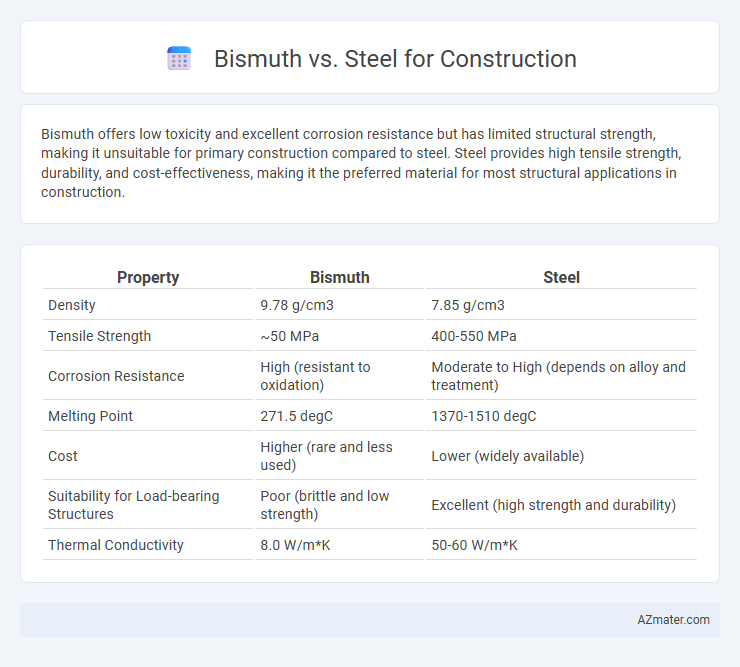Bismuth offers low toxicity and excellent corrosion resistance but has limited structural strength, making it unsuitable for primary construction compared to steel. Steel provides high tensile strength, durability, and cost-effectiveness, making it the preferred material for most structural applications in construction.
Table of Comparison
| Property | Bismuth | Steel |
|---|---|---|
| Density | 9.78 g/cm3 | 7.85 g/cm3 |
| Tensile Strength | ~50 MPa | 400-550 MPa |
| Corrosion Resistance | High (resistant to oxidation) | Moderate to High (depends on alloy and treatment) |
| Melting Point | 271.5 degC | 1370-1510 degC |
| Cost | Higher (rare and less used) | Lower (widely available) |
| Suitability for Load-bearing Structures | Poor (brittle and low strength) | Excellent (high strength and durability) |
| Thermal Conductivity | 8.0 W/m*K | 50-60 W/m*K |
Introduction to Bismuth and Steel in Construction
Bismuth, a brittle metal with low toxicity and high density, is rarely used in construction due to its limited structural strength and high cost compared to steel. Steel, an alloy known for exceptional tensile strength, durability, and versatility, dominates the construction industry in applications such as beams, reinforcements, and frames. The fundamental differences in mechanical properties and availability make steel the preferred choice for structural construction materials.
Material Properties: Bismuth vs Steel
Bismuth is a brittle metal with low tensile strength and high density, making it unsuitable for structural applications compared to steel. Steel exhibits superior mechanical properties such as high tensile strength, ductility, and impact resistance, essential for durable construction materials. The corrosion resistance of bismuth is better than unprotected steel, but steel alloys with protective coatings provide balanced strength and longevity in construction environments.
Strength and Durability Comparison
Steel exhibits superior strength and durability compared to bismuth, making it the preferred material in construction projects that demand high load-bearing capacity and long-term structural integrity. Bismuth's lower tensile strength and brittleness limit its use primarily to specialized applications rather than standard construction. Steel's resistance to corrosion and fatigue significantly enhances its lifespan, outperforming bismuth in durability under various environmental conditions.
Weight and Density Differences
Bismuth has a density of approximately 9.78 g/cm3, which is significantly lower than steel's average density of about 7.85 g/cm3, making steel denser despite bismuth being a heavy metal. However, steel is much stronger and more structurally reliable for construction, while bismuth's higher weight per volume may limit its practical use in load-bearing applications. The substantial difference in density and mechanical properties dictates steel's dominance in construction frameworks over bismuth.
Corrosion Resistance and Longevity
Bismuth exhibits excellent corrosion resistance in acidic and neutral environments, making it highly durable for specific construction applications where chemical exposure is a concern. Conversely, steel, especially stainless steel, offers robust corrosion resistance in a broad range of conditions due to its chromium content, supporting long-term structural integrity in harsh climates. Steel's superior strength-to-weight ratio and established longevity in construction make it the preferred choice for large-scale projects requiring both durability and resilience against corrosion.
Environmental Impact and Sustainability
Bismuth offers a lower environmental impact compared to steel due to its non-toxic nature and greater recyclability, reducing landfill waste and pollution. Steel production requires significant energy and emits high levels of CO2, making it less sustainable despite its durability and strength in construction. Utilizing bismuth in specialized construction applications can enhance sustainability goals by minimizing resource depletion and toxic emissions.
Cost Analysis: Bismuth vs Steel
Bismuth is significantly more expensive than steel, with steel costing roughly $600 per ton, while bismuth prices can exceed $15,000 per ton, making it impractical for most large-scale construction projects. Steel's affordability, combined with its high tensile strength and widespread availability, ensures it remains the preferred material in terms of cost-efficiency. The high cost of bismuth limits its use to specialized applications rather than structural construction where budget constraints are critical.
Applications in Modern Construction
Bismuth, known for its non-toxic and corrosion-resistant properties, finds niche applications in modern construction as a green alternative in alloys and specialized coatings for environmentally sensitive projects. Steel remains the primary choice in contemporary construction due to its exceptional tensile strength, durability, and versatility, making it indispensable for structural frameworks, reinforcements, and large-scale infrastructure. Innovations in steel production, such as high-strength low-alloy (HSLA) steels, continue to enhance construction efficiency and sustainability, setting it apart from bismuth in mainstream construction uses.
Safety and Health Considerations
Bismuth offers superior non-toxicity and environmental safety compared to steel, as it is inherently non-toxic and does not release harmful fumes during processing, making it safer for workers and surrounding communities. Steel, although stronger, poses health risks due to potential exposure to toxic heavy metals like lead and chromium during manufacturing and corrosion, requiring strict handling protocols to minimize respiratory and skin hazards. For construction applications prioritizing occupational health and safety, bismuth's biocompatibility and reduced environmental impact provide significant advantages in minimizing toxic exposure and long-term health consequences.
Future Trends and Innovations
Bismuth, known for its non-toxic and corrosion-resistant properties, is emerging as a niche material in specialized construction applications, especially in eco-friendly and health-conscious buildings. Steel remains the dominant construction material due to its high strength-to-weight ratio, recyclability, and cost-effectiveness, but innovations like ultra-high-performance steel and smart steel composites are shaping its future use. Future trends emphasize sustainable materials, where bismuth alloys may complement advanced steel variants to enhance building longevity, reduce environmental impact, and improve structural health monitoring.

Infographic: Bismuth vs Steel for Construction
 azmater.com
azmater.com